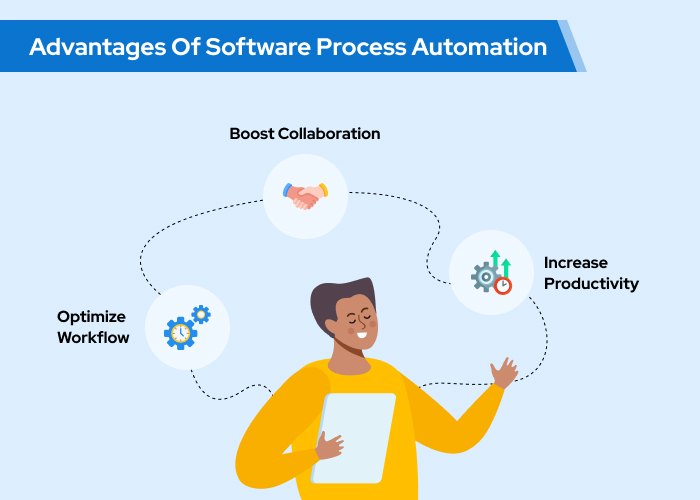Define process automation in software project management
Thus, it gives you more time to concentrate on other tasks, including improving the software’s design or taking on challenging coding tasks. For instance, code development involves manual steps like coding, compiling, transferring to a server, and executing. You can automate this using software process automation.
Advantages of Software Process Automation

- Optimize workflow: There are numerous manual procedures involved in regular employee workflow. Optimizing the workflow with automation can help employees pay attention to other important tasks and increase productivity. Thus, software procedure automation becomes advantageous for workflow optimization.
- Boost Collaboration: Furthermore, it fosters communication and teamwork. Team members will readily remain up to date on project progress with the help of technological advancements like real-time updates. For instance, when a developer completes its tasks, the status should be updated directly.
- Increase Productivity: Teams may work faster by automating repetitive operations like testing, error tracking, and code release. Thus, the developers can concentrate on the project’s more intricate and creative elements because of its efficiency. Automation systems can instantly adjust and assist in managing rising workloads without the need for extra workers as the project scope grows.
Stages of automation in software project management
The project’s ultimate depends on four phases of process automation.
- Planning and Requirement Gathering: Use tools like Alian Hub, Trello, or Asana to automate the collection and organization of project requirements. Furthermore, tools like Scoro can automate task duration estimation based on historical data or predefined algorithms.
- Project Scheduling: Tools like Alian Hub can generate To-do lists automatically based on task dependencies and durations. Thus, you can utilize tools that automatically allocate resources based on availability and skillsets.
- Development: Automate the build, test, and deployment processes using CI/CD pipelines with tools like Jenkins, GitLab CI, or CircleCI. Furthermore, implement automated testing frameworks like Selenium for UI testing, Jest for JavaScript unit testing, or PyTest for Python unit testing.
- Monitoring and Tracking: Tools like Alian Hub, JIRA, or Asana can automatically track task progress based on user updates or integration with development tools. Utilize these monitoring tools to automatically collect performance metrics and generate reports.
- Communication and Collaboration: Configure project management tools to send automated notifications for task assignments, updates, or deadlines.
- Deployment and Release: Automate infrastructure provisioning and configuration. Use CI/CD tools to automate the deployment process, including code merging, testing, and deployment to production environments.
Choose your tool for automation
- Take into account the scope and difficulty of your initiatives. While some platforms are more reliable and appropriate for large-scale corporate projects with intricate needs, others are better for smaller, simpler initiatives.
- Moreover, assess the size of your team. While some platforms include sophisticated capabilities for communication and collaboration that are appropriate for big, dispersed teams, others have features designed specifically for small, co-located teams.
- Look for the level of flexibility and scalability offered by the tool.
- Furthermore, look for collaboration features such as real-time messaging, file sharing, task assignments, and commenting.
Conclusion
To sum up, process automation in software project management is crucial for raising productivity, cutting down on mistakes, and freeing up teams to work on other important projects.
Throughout the course of a project, teams may improve communication, streamline workflow, and raise productivity by using technology to automate repetitive tasks.
Additionally, automation tools expedite processes, saving time and money while improving project outcomes. These processes range from planning and requirement collection to deployment and release.
FAQs
Why is process automation important in software project management?
What are some common tools used for automation in software project management?
How can process automation benefit software development teams?
What factors should be considered when choosing a tool for automation in software project management?
How can process automation contribute to project success?
Ravi Bhojani is the Chief Marketing Officer (CMO) at Alian Software, where he spearheads the company’s marketing strategies and drives its brand presence in the competitive IT services landscape. With over a decade of experience in the technology and marketing sectors, Ravi has consistently demonstrated his ability to blend innovative marketing techniques with deep industry knowledge to deliver outstanding results.